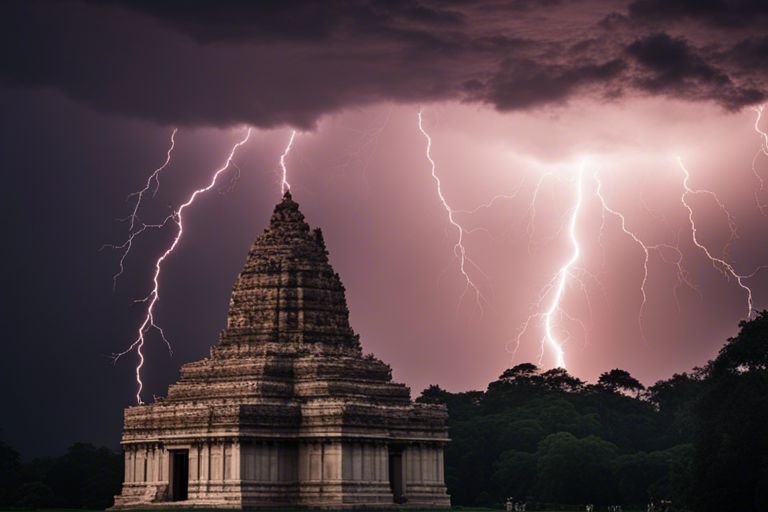Ruminate on the question of whether lightning is a sign from God, and you will find yourself delving into the intersection of the natural world and religious belief. Throughout history, mankind has sought to interpret the powerful and awe-inspiring forces of nature through a spiritual lens, seeking to understand the divine significance of events such as lightning strikes. In this guide, I will explore the various religious interpretations of lightning and other natural phenomena, shedding light on the ways in which different faith traditions have sought to make meaning of these mysterious and potentially dangerous occurrences. Whether you are a devout believer or simply curious about the relationship between religion and nature, this exploration will provide valuable insights into the ways in which humans have sought to find spiritual significance in the world around them.
Key Takeaways:
- Interpretation: Many religious and spiritual beliefs interpret natural phenomena, such as lightning, as a sign or message from a higher power.
- Cultural Variation: The interpretation of natural phenomena varies widely across different religious and cultural contexts, leading to diverse beliefs about the meaning of lightning.
- Theological Significance: Lightning is often seen as a symbol of divine power, judgment, or communication in religious traditions, shaping the way believers understand and respond to these natural phenomena.
- Historical Perspective: Throughout history, lightning has been viewed as both a fearsome display of wrath and a benevolent message from the divine, reflecting evolving religious interpretations over time.
- Spiritual Guidance: Believers may seek guidance and insight from religious leaders or texts when interpreting lightning and other natural phenomena, deepening their faith and understanding of their traditions.
Interpreting Natural Phenomena in Religious Contexts
Before delving into the specific interpretations of natural phenomena in religious contexts, it’s important to understand the broader framework within which these interpretations take place. Throughout history, human societies have sought to make sense of the world around them, often attributing natural events to the actions or will of the divine. This practice, known as religious interpretation of natural phenomena, has been a constant in the development of religious thought across various cultures and periods of time.
Historical Perspectives
In ancient civilizations such as those of Mesopotamia, the Indus Valley, and Egypt, natural phenomena were often interpreted as manifestations of the gods’ power and will. For example, the ancient Egyptians viewed the annual flooding of the Nile River as a divine act, essential for the fertility of the land and the prosperity of their civilization. Similarly, the Greeks attributed thunder and lightning to the actions of Zeus, the king of the gods. Throughout history, people looked to the heavens and other natural occurrences as signs of divine intervention, seeking to understand their place in the world.
Cultural Differences
The interpretation of natural phenomena in religious contexts differs greatly from one culture to another. In some cultures, certain natural events may be viewed as ominous or dangerous, while in others they are seen as auspicious or positive. For example, in some Indigenous cultures, a solar eclipse may be interpreted as a warning or as a time of spiritual significance, whereas in traditional Chinese culture, a solar eclipse is seen as a favorable event, signifying the alignment of cosmic forces. These cultural differences highlight the diverse ways in which humans have sought to understand and interpret the natural world within a religious framework.
Lightning as a Sign from God
The phenomenon of lightning has been interpreted as a sign from God in various religious and cultural contexts. Many belief systems view lightning as a manifestation of divine power, wrath, or communication from the heavens. As such, the interpretation of lightning has played a significant role in shaping religious practices and beliefs.
Religious Beliefs and Interpretations
In many religious traditions, lightning is seen as a powerful symbol with deep spiritual significance. For example, in Christianity, lightning is often associated with the power and presence of God, as well as divine judgment. In Hinduism, lightning is believed to be a manifestation of the god Indra, who is the ruler of the heavens and the bringer of rain. Similarly, in Norse mythology, lightning is associated with the god Thor, who is the protector of mankind and the bringer of fertility and abundance.
Case Studies
1. In the Bible, the story of the prophet Elijah and the contest with the prophets of Baal on Mount Carmel is a well-known example of lightning as a sign from God. According to the text, God sent down fire from heaven in the form of lightning to consume the offering made by Elijah, thus demonstrating his power and authority.
- 2. Superstition and fear: Lightning has also been associated with negative connotations, instilling fear and superstition in many cultures. For example, in ancient Rome, it was believed that being struck by lightning was a sign of disfavor from the gods, and lightning rods were installed on buildings to protect against such a fate.
- 3. Scientific understanding: Modern science has provided a more comprehensive understanding of the natural phenomena of lightning, but its cultural and religious significance continues to influence beliefs and practices around the world.
Factors Influencing Interpretations
After researching various cases and talking to experts in the field, I have come to understand that there are several factors that influence how people interpret natural phenomena such as lightning as signs from God. These factors include societal influence, personal beliefs, and cultural context.
- Location of individual in the world
- Religious background and teachings
- Media and popular culture
Assume that these factors can heavily impact a person’s interpretation of natural events and their religious significance.
Societal Influence
Societal Influence
Societal influence plays a significant role in shaping our interpretations of natural phenomena. From childhood, we are exposed to societal beliefs and traditions, which can heavily influence how we view and interpret events around us. Societal norms and expectations can guide our understanding of religious signs in natural occurrences, which in turn, can impact our personal beliefs.
Personal Beliefs
Personal Beliefs
Our personal beliefs also play a crucial role in how we interpret natural phenomena in a religious context. The deeply held beliefs we carry regarding spirituality, religion, and the supernatural can shape our perception of events like lightning. These personal beliefs can be influenced by our upbringing, experiences, and individual spiritual journeys, ultimately impacting how we view and interpret signs from a higher power.
It’s important to recognize the impact of these factors when considering interpretations of natural phenomena. The societal and personal influences on individual perspectives demonstrate the complex nature of these interpretations and the role they play in religious contexts.

Is Lightning a Sign from God – Interpreting Natural Phenomena in Religious Contexts
On the whole, interpreting natural phenomena in religious contexts is a deeply personal and subjective experience. While some may see lightning as a sign from God, others may view it as simply a natural occurrence. It is important to understand that these interpretations can vary greatly depending on one’s religious beliefs, cultural background, and personal experiences. Ultimately, the meaning of natural phenomena such as lightning is a matter of individual interpretation and should be respected as such. It is important to approach these discussions with an open mind and a willingness to learn from the beliefs of others.
FAQ
Q: Is Lightning a Sign from God?
A: In many religious contexts, lightning is often interpreted as a sign from God. However, interpretations vary among different faiths and cultures. Some may see it as a symbol of divine power or punishment, while others may view it as a message or warning. Ultimately, the interpretation of lightning as a sign from God is a matter of personal belief and spiritual understanding.
Q: Where is lightning mentioned in religious texts?
A: Lightning is mentioned in various religious texts, such as the Bible, the Quran, and the Vedas. These mentions often portray lightning as a powerful force under divine control, and its significance is often linked to the teachings and beliefs of the respective faith traditions.
Q: How do different religions interpret lightning?
A: Different religions interpret lightning in diverse ways. For example, in Christianity, lightning can be seen as a symbol of God’s power and judgment. In Norse mythology, lightning is associated with the god Thor and his protective influence. In Hinduism, lightning can symbolize the power of the gods or the forces of nature. Interpretations are influenced by cultural and religious teachings, as well as individual beliefs.
Q: What is the scientific explanation of lightning?
A: Scientifically, lightning is a natural phenomenon that occurs as a result of the buildup and discharge of electrical energy in the atmosphere. It is a complex process involving the interaction of air, moisture, and temperature differences. While the scientific explanation of lightning does not diminish its awe-inspiring nature, it provides a rational understanding of its occurrence.
Q: How should one approach the interpretation of lightning in a religious context?
A: The interpretation of lightning in a religious context should be approached with respect for diverse beliefs and traditions. It is important to understand the cultural and religious significance attached to lightning in different faiths. Additionally, individuals should consider their own spiritual beliefs and seek guidance from religious leaders or scholars when seeking to interpret natural phenomena such as lightning. Open-mindedness and a willingness to learn from others’ perspectives are essential in approaching the interpretation of lightning in a religious context.











